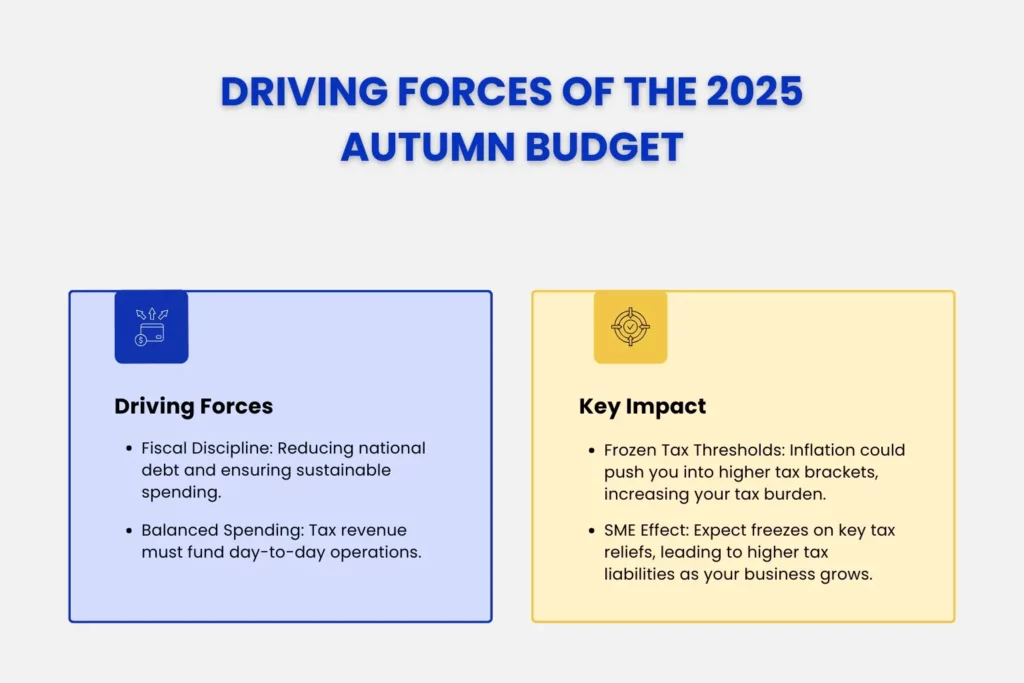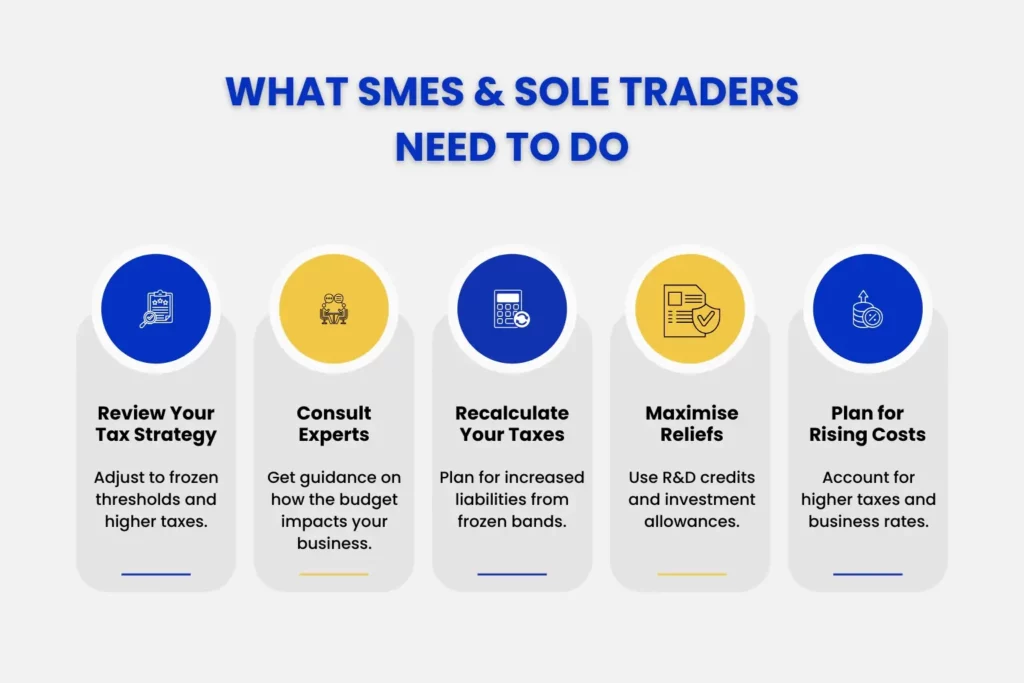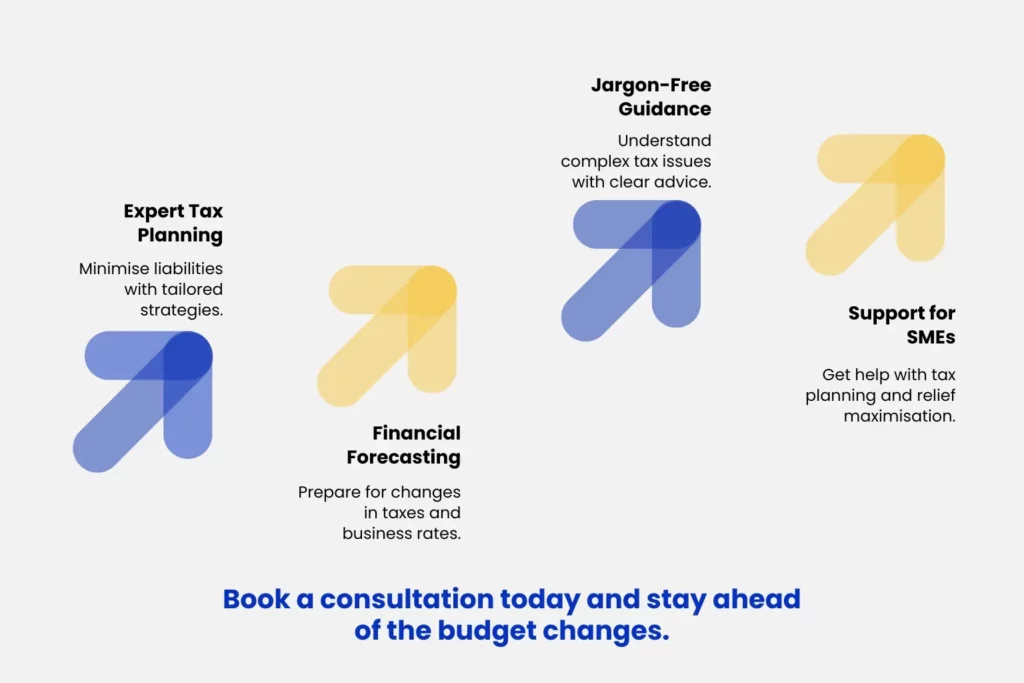Introduction
All the UK taxpayers, business owners and sole traders alike, please mark your calendar for the UK Autumn Budget which is set for November 26, 2025. Each year the chancellor outlines certain plans to the parliament, so it’s worth paying attention to this post.
In this post, we’ll help you uncover the UK Autumn Budget 2025 predictions and what they could mean for your business. Let’s get into it.
What’s Driving This Budget? (Rachel Reeves’ Fiscal Rules)
You all might have heard about Rachel Reeves’ fiscal rules. If you haven’t, now is the time to know what they actually mean in plain english.
Chancellor Rachel Reeves has set out a set of fiscal rules to get the UK’s finances back in shape. This means two things: Debt Reduction and Balanced Spending. Let’s understand them.
- Debt Reduction: The rule intends to put the government’s money on diet.- not overnight, but steadily. Public debt, which is a major link to increasing national debt, must be reduced.
- Balanced Spending: It states that the government must aim to balance its day-to-day spending with tax revenue. Simply put, it must fund its operations from tax revenue, rather than borrowing[1].

Why Should You Care?
These rules are expected to be carried out in a subtle manner, rather than through dramatic tax cuts. While it may sound simple and harmless, it’s not.
For us, this means we can expect the freezing or adjusting of threshold. Although this may seem like nothing has changed, it actually increases the amount of tax we pay, as wages rise. You will be paying more tax without even realising.
For SMEs, and people who are running their business, this could mean a freeze to their major tax reliefs. The government could freeze the personal allowance and income tax bands – forcing them to pay higher taxes as they grow.
Key Tax Predictions in Autumn Budget 2025
Let’s dive into the key UK Autumn Budget 2025 predictions that could affect your business and personal finance.
#1 Income Tax & National Insurance (NI)
If you’re self-employed or a sole trader, this section’s for you.
Income Tax: The most likely change will be the freeze in the income tax bands. This means that the rates themselves probably won’t change, but as the inflation pushes the wages up, more people will get dragged into higher tax brackets. They’ll find themselves paying bigger chunks at 40% instead of the usual 20%.
National Insurance (NI): Same story here. The threshold for Class 2 and Class 4 NI Contributions may freeze. Class 2 NI contribution would freeze at £12,570 (2025-26), while for class 4, it would be £50,270. So even if your wages/earnings go up with inflation, you’ll end up paying more taxes.
Here’s a simple example to help you better understand the concept.
Suppose you are a sole trader with a business income of £40,000 (for 2025-26 tax year). Before the freeze, even if the inflation pushed your income to let’s say £55,000 , you would likely have stayed in the same bracket. However since the thresholds are now frozen, you are now pushed into the 40% income tax bracket.
Your National Insurance contributions also increase, as the Class 4 NI threshold is stuck at £50,270. This means you will be paying more of your hard-earned money in taxes, despite the fact that the rise in income was simply due to inflation.
| Details | Before Freeze | After Freeze |
| Income | £55,000 | £55,000 |
| Personal Allowance | £12,570 | £12,570 |
| Taxable Income | £55,000 – £12,570 = £42,430 | £55,000 – £12,570 = £42,430 |
| Basic Rate Tax Band | £12,570 to £50,270 | £12,570 to £50,270 |
| Basic Rate Tax Calculation | 20% on £37,700 (from £12,570 to £50,270) | 20% on £37,700 (from £12,570 to £50,270) |
| Higher Rate Tax Band | £50,270 to £55,000 | £50,270 to £55,000 |
| Higher Rate Tax Calculation | 40% on £4,730 (from £50,270 to £55,000) | 40% on £4,730 (from £50,270 to £55,000) |
| National Insurance | Not applicable | 9% on £4,730 (£55,000 – £50,270) |
| NI Calculation | Not applicable | 9% of £4,730 = £426 |
| Total Tax | £7,540+ £1,892= £9,432 | £7,540+£1,892+£426 (NI) = £9,858 |
#2 Dividend Tax
If you run a limited company, this is for you. Word on the street is that the chancellor may increase the dividend tax rate, or reduce the allowance. So if you are a director currently, and you take, let’s say £20,000 in dividends each year, you get up to £5,000 tax-free under the dividend allowance. This means that you pay tax only on £15,000.
If this autumn budget prediction comes true, then the chancellor may reduce the dividend allowance, to let’s say £2,000. In this case, you will be paying tax on £18,000 at the same 8.75% rate – ultimately paying more in taxes.
Why it Matters: Directors and business owners who pay themselves via dividends rather than salary- to be tax-smart, will now have to re-think on how they pay themselves. What worked before as a tax-saving strategy will now prove to be more expensive, leading to higher tax burden.
#3 Corporation Tax & Business Profits
A spike in the corporation tax is highly unlikely, considering it was recently raised to 25% [2].
The 2025 Autumn Budget can bring about- a boost in business expansion. The government seems keen on helping businesses invest in themselves by letting them deduct the full cost of things like equipment and machinery from their profits before tax. There is also speculation of R&D Credit reliefs that could make a real difference to the bottom line, when you are constantly trying to improve, develop and evolve.
#4 Capital Gains Tax (CGT)
There are assumptions that the government would make the CGT tax higher. This would mean that the business owners then have to pay more tax when they sell their assets, or business itself. There is another prediction-that the annual exemption might also get cut. If this happens, you would then be paying more taxes on smaller gains than before.
#5 Property, Wealth & Inheritance Tax
If you own valuable property or are thinking of passing down your wealth, you then need to keep note of the following possible changes.
- We might see a higher council tax rate on expensive properties. There could also be a new wealth tax, targeting people with significant assets.
- There might also be new restrictions on giving money away tax-free – which matters when you run a family business, or are planning your estate.
Example 1: Let’s presume, you own a property worth £1.5 million. Under current rules, if you want to leave it to your children, your property will fall under the nil-rate band for Inheritance Tax (IHT). This means your heirs don’t have to pay any tax on it.
However, if the government decides to introduce a new wealth tax, then you are liable to pay tax above a certain threshold.
Example 2: You decide to give a part of your wealth to your children or business partner.Using the annual exemption for gifts, your gifts will be tax-free. However, if the rule changes, let’s say the government imposes a new restriction where you might have to pay tax after reaching a certain threshold. This would then result in an increased tax liability with tax being charged on the value of the gift.
Business Costs & Reliefs
Coming years could see a reform in business rates, VAT and tax reliefs. The Autumn Budget 2025 might provide smaller enterprises with more reliefs and rebates, compared to high-street retailers and larger logistics companies. SMEs would be encouraged to utilise various tax reliefs like R&D tax credits, investment allowances and such; helping them to grow and sustain.
Savings, Pensions & Personal Finance
Changes to pension and savings will likely feature in the upcoming Autumn Budget 2025. The government might tweak ISA rules to encourage taxpayers to invest in equities rather than just saving cash. There is also a talk of potential limits on salary sacrifice pension schemes, which could change how you and your employees save for retirement.
What All This Actually Means for Small Businesses & Sole Proprietors
Now, over to what these UK Autumn Budget 2025 predictions, actually constitute?

- To get tax planning sorted: The post calls out UK Taxpayers, SMEs, sole traders and other business structures to start planning ahead. Start thinking how these frozen thresholds, higher council rate, changes in pension scheme and investment options can affect you and your business. Have a talk with expert tax planning firms to help you deal with the changes when required. Don’t contemplate, establish mitigation strategies beforehand.
- Hire an Expert: Get the help of a reputed finance director to help you with budgeting and forecasting. Learn what works for you, and which step is eating into your income. Get prepared for potential higher costs and increased taxes. Better know what’s coming, than being caught off guard.
The Political Side of Things
The Rachel Reeves government is focused on maintaining fiscal discipline, while promoting sustainable, economic growth. This budget is going to reflect a balance between tightening public finances and supporting key sectors, especially with an election on the horizon.
Expect sustainable-driven growth, financial support for struggling businesses, and strategic investments within green energy, technology, and infrastructure sectors. We may also see stealth taxes like freezing personal tax thresholds or limiting public spending on certain welfare programmes. Overall, the budget will aim to establish a middle ground to avoid both drastic cuts and heavy tax hikes- that could negatively impact voters’ sentiments.
Next Steps & Action Plan for SMEs
- Review Everything: Go through your business and personal finances with fresh eyes. Make changes to your plans & strategies based on what has actually changed.
- Get Expert Advice: Get help from professionals to help translate the budget in easy terms, and what actions need to be taken ahead of it.
- Plan Ahead: Don’t just think about meeting the recent changes; think about its long term implications and plan your finances accordingly.
How Julian Hobbs Can Help You Navigate This
We will help you comprehend the Budget in simple terms, revise your tax and investment strategies, and assist with accurate forecasting so you’re only paying what you absolutely need to-and not a penny more. Our chartered accountants work with SMEs and sole traders across Hertfordshire to help them take advantage of the rebates and reliefs being offered to them. Trust us to give you jargon-free advice and strategic guidelines so you plan effectively for your future.

People Also Ask:
When is the UK Autumn Budget 2025?
The budget is scheduled for November 26, 2025.
What are Rachel Reeves’ fiscal rules?
Rachel Reeves’ fiscal rules focus on reducing the national debt, limiting government borrowing and promoting day-to-day funding from tax revenue.
What changes are expected for pension contributions and savings?
There may be restrictions on salary sacrifice-pension contributions and adjustments to the ISA limits, where taxpayers might be encouraged to invest in equity rather than just saving cash .
What should SMEs do to prepare for the UK Autumn Budget 2025?
SMEs should review their tax planning strategies, consult with their financial advisors, and prepare for possible changes to tax thresholds and business rates.
What to watch on Budget Day
Watch out for changes to income tax, business tax reliefs, and potential wealth tax reforms. Also, keep an eye on pension and savings updates and the government’s spending priorities.

